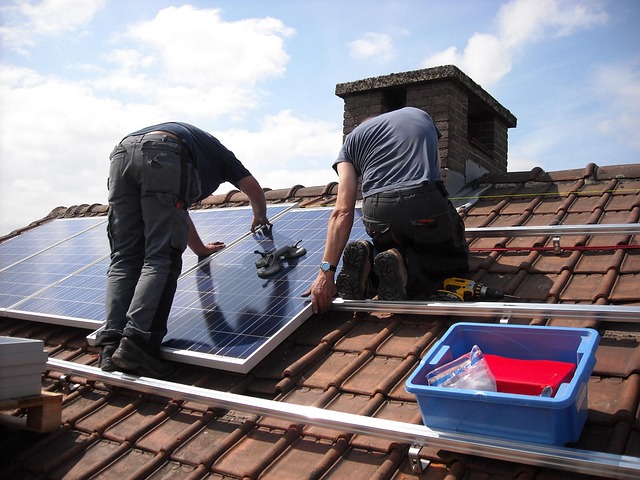Eco-friendly roofing is a growing trend, offering significant environmental benefits beyond aesthetics. Sustainable roofing solutions like solar panels and recycled materials reduce energy consumption, waste, and carbon footprints. These innovations promote water efficiency, enhance insulation, and foster biodiversity, aligning with global sustainability goals. Integrating solar and water-efficient systems provides a powerful dual approach to durable, eco-conscious roofing for both residential and commercial applications.
The pursuit of sustainable living extends beyond walls and into our roofs. Eco-friendly roofing isn’t just a trend; it’s a vital step towards mitigating environmental impact and promoting a greener future. This article delves into the significance of eco-conscious roofing, exploring sustainable solutions like green roofing materials, solar panels, and water-efficient systems. By adopting these innovative approaches, we can transform our rooftops into powerful tools for preserving our planet.
- Understanding the Importance of Eco-Friendly Roofing
- Exploring Sustainable Roofing Solutions
- Benefits of Green and Recycled Roofing Materials
- Integrating Solar and Water-Efficient Roof Systems
Understanding the Importance of Eco-Friendly Roofing
The choice of roofing materials can significantly impact a building’s environmental footprint. Eco-friendly roofing isn’t just about aesthetics; it’s a crucial aspect of sustainable architecture that considers both the structure’s immediate and long-term effects on the planet. Incorporating green roofing materials offers numerous benefits, from reduced energy consumption to minimized waste generation. An energy-efficient roof can lower a building’s carbon footprint by regulating interior temperatures, thereby reducing reliance on HVAC systems.
Additionally, innovative solutions like solar roofing and recycled roofing materials contribute to environmentally friendly roofing practices. Solar panels integrated into roofs not only generate clean energy but also extend the lifespan of traditional roofing materials. Similarly, using recycled content in roofing helps divert waste from landfills while providing durable and cost-effective options. These sustainable roofing solutions not only promote a healthier planet but also often result in water-efficient roofs, further mitigating environmental impact by reducing water usage associated with cooling and landscaping.
Exploring Sustainable Roofing Solutions
In the pursuit of a greener future, exploring sustainable roofing solutions is more than just a trend—it’s an essential step towards reducing our environmental footprint. Eco-friendly roofing offers a myriad of benefits, from mitigating climate change to conserving natural resources. Traditional roofing materials often contribute to high energy consumption and waste accumulation due to their non-biodegradable nature. However, the advent of green roofing materials has revolutionized the industry. These innovative solutions include solar roofing, which harnesses sunlight for energy, and recycled roofing materials that divert waste from landfills.
Adopting sustainable roofing practices not only helps in combating pollution but also promotes water conservation through water-efficient roof designs. Green roofs, with their lush vegetation, provide insulation, reduce urban heat islands, and even create habitats for local wildlife. As awareness grows among homeowners, businesses, and builders, the demand for eco-conscious roofing options is on the rise. This shift towards environmentally friendly roofing is a key component in achieving global sustainability goals, ensuring a cleaner, healthier planet for future generations.
Benefits of Green and Recycled Roofing Materials
The shift towards eco-friendly roofing has gained significant momentum as folks become more environmentally conscious. Green roofing materials offer a plethora of benefits, making them an attractive sustainable roofing solution. These materials not only reduce the carbon footprint but also contribute to better insulation, minimizing energy usage for heating and cooling purposes. Additionally, green roofs can help mitigate urban heat islands, providing cooler environments in cities.
One of the most innovative aspects is the integration of solar panels into roofing systems, creating solar roofing that generates clean energy. Recycled roofing materials are another game-changer in promoting eco-conscious roofing. By utilizing recycled content, these materials reduce waste and strain on natural resources, resulting in water-efficient roofs that minimize stormwater runoff. Moreover, they offer long-lasting durability, ensuring a lower environmental impact throughout their lifespan.
Integrating Solar and Water-Efficient Roof Systems
Integrating Solar and Water-Efficient Roof Systems offers a dual eco-smart solution for durable roofing. By combining solar panels with water-efficient technologies, homeowners and businesses can significantly reduce their carbon footprint and water usage. Solar roofing materials generate clean energy, offsetting electricity costs and reducing reliance on non-renewable resources. Meanwhile, water-efficient roofs minimize rainwater runoff, mitigating flooding risks and preserving local water sources.
Green roofing materials play a pivotal role in this integration. Recycled roofing shingles and other sustainable roofing solutions not only reduce waste but also provide insulation, enhancing energy efficiency. These eco-conscious roofing options help cool down urban areas, known as the urban heat island effect, while promoting biodiversity by creating habitats for local wildlife. In terms of long-term sustainability, these innovative roof systems contribute to a greener, more resilient future.
In light of the growing need for environmentally conscious building practices, embracing eco-friendly roofing offers a promising path towards a greener future. By exploring sustainable roofing solutions like green and recycled materials, as well as integrating solar and water-efficient systems, we can significantly reduce our carbon footprint while enhancing the durability and efficiency of our homes and businesses. This shift towards eco-conscious roofing not only benefits the planet but also sets the stage for a more resilient and sustainable built environment.
